Nicholas Gill ventures into the dark, purplish heart of the global star-chef bacchanal called Gelinaz!
LIMA, Peru
The sun has already set behind the Huaca Pucllana when the guests begin to arrive. The pyramid complex in the heart of Lima’s posh Miraflores neighborhood takes up several urban blocks that are otherwise occupied by condo towers. The adobe complex was a ceremonial and administrative center used by the Lima and later the Wari as far back as 200 AD. As recently as 2010 they were still pulling mummies out of it. There’s just enough ghoulishness about it to make a perfect backdrop for Gelinaz!, a spectral spiritdance of absurdity and cuisine.
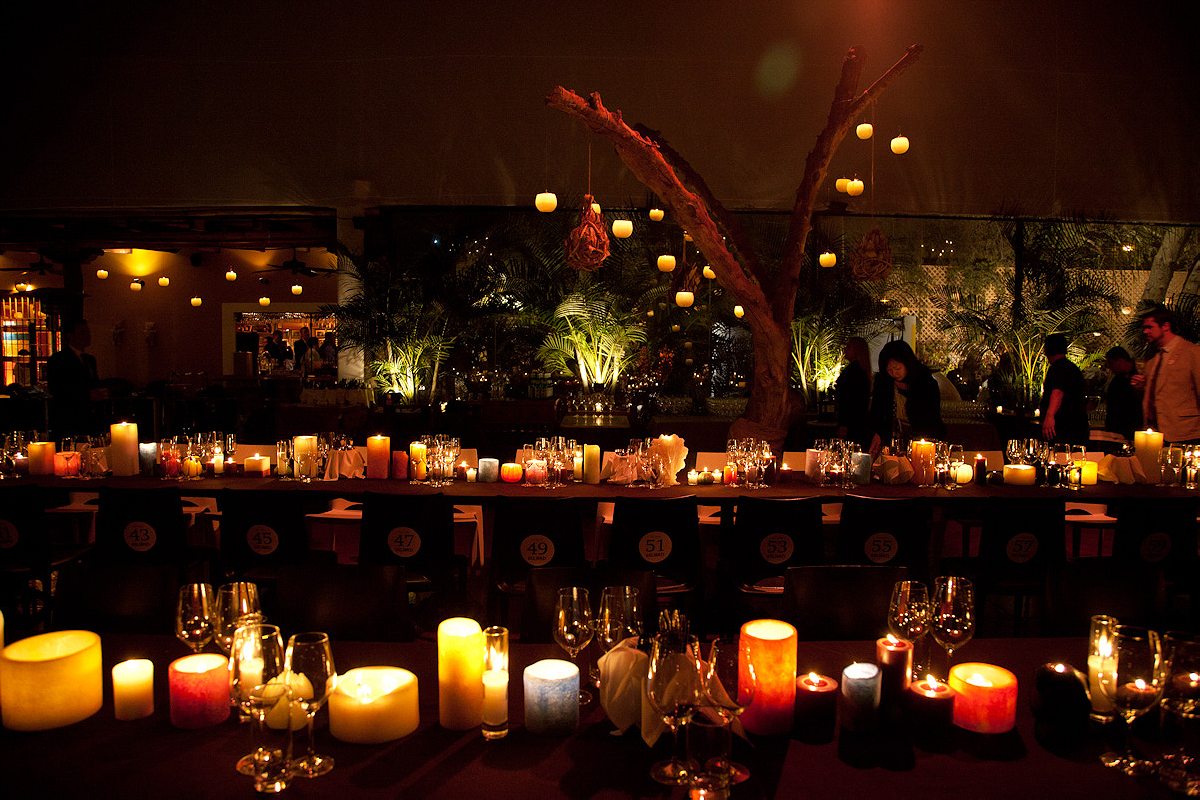
Candles are lit on the pathways throughout the grounds and ambient lights cast a glow against the face of the pyramid. There would be more culinary star power at this 8-hour, 22-course octopus Gelinaz! dinner, nicknamed Pulpo Fiction (pulpo, of course, being Spanish for octopus, the sacrificial headliner of the evening), than perhaps any other time in the history of South America. The Peruvian edition of Gelinaz!, the ever-changing misfit band of chefs that pops up in different cities around the globe—the name is supposedly a cross between a tribute to the Geline de Touraine breed of chicken, the pronunciation of initial member Fulvio Pierangelini’s name, and an homage to the band Gorilla—had attracted everyone from Alex Atala and Andoni Aduriz to Daniel Patterson, Magnus Nilsson, and Massimo Bottura. It total, there would be 20 Michelin stars and a sizable slice of the World’s 50 Best restaurant list represented in the night’s menu.
It’s a multisensory experience that extends beyond tastes and smells: food as performance art.
As with past Gelinaz! events—most recently in Ghent, Belgium in May—the chefs are inspired by one particular recipe, which they then deconstruct and make into their own and then (this is where it gets weird) pair it with sights and sounds. It’s a multisensory experience that extends beyond tastes and smells: food as performance art. In this case, the central dish is Peruvian chef Gastón Acurio’s Pulpo al Cilindro, aka octopus cooked in a metal cylinder. The dish is a cult classic in Peru, where octopus is revered among diners. The eight-armed cephalopod has been adapted to every wave of immigrants in Peruvian history. The Spanish served it in a purple olive sauce in pulpo al olivo. The Chinese stir-fried it, for saltado de pulpo. The Japanese slice it thinly for sashimi de pulpo. Though today, most commonly, it’s served grilled.
Even before new cultures had found Peru’s shores, the octopus was one of the most emblematic ingredients in a country full of emblematic ingredients. Decorated ceramics found at the huaca and other archeological complexes along coastal Peru reveal a worship of the sea, where waves, sea lions, eels, sharks, and octopi are featured prominently. One of the most famous Moche relics, recovered in London in 2006 after huaqueros (Andean tomb-raiders) robbed the La Mina in the Jequetepeque Valley in 1988, features a godlike gold octopoid with a hybrid human feline face. Some have called it the Moche Mona Lisa.
As I approach the on-site restaurant, fifty or so people are milling around in the garden area with champagne and pisco sours. No one knows what to expect, yet in the days leading up to the event everyone and anyone scrambled to land an invitation. A young Chilean journalist emailed Andrea Petrini, the Italian gastronome who organizes the event, saying if they don’t let her in they could “shove the octopus up their fucking asses.” Another woman made the delicate suggestion that she should be admitted because she wanted to get her octopussy wet. Both got in. Those that tried more formal approaches didn’t.
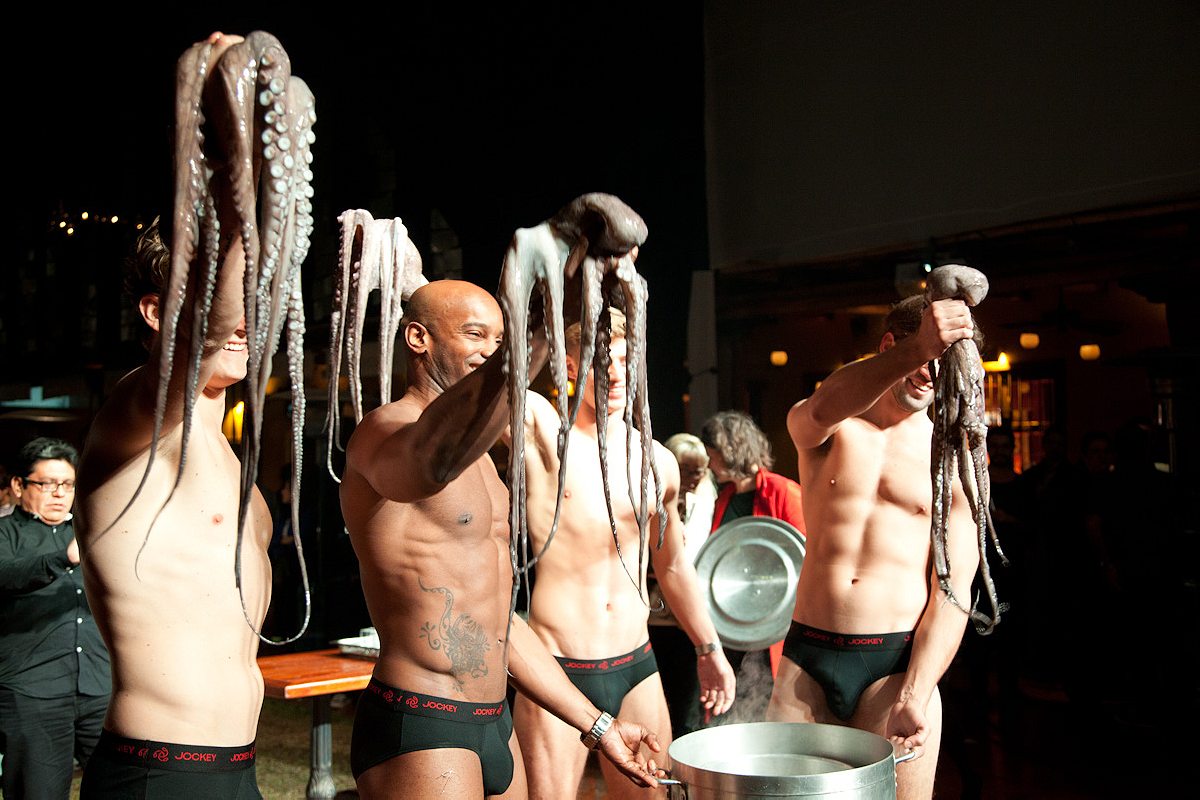
I did have fair warning about the oddities of the event. Specifically, the day before, at the larger and more staid Mistura food festival in Magdalena del Mar on Lima’s coast—where more than 300,000 people, mostly Peruvians from all walks of life, attend over the course of a week—some of the Gelinaz! luminaries hijacked the stage for an hour of complete disorder. There were twenty people talking simultaneously in five different languages while a rock band played increasingly louder and louder. More than once someone shouted out, “what the fuck is going on?” I woman I know texted me from the other side of the auditorium. “I think Iñaki and Andrea are smoking pot, from what I can see from here. And I don’t blame them.” When it is was over, my friend was pissed. “I wasted a fucking hour of my life. So much talent on one stage just wasted.”
In Ghent in June, there were naked women and a fiddler playing Iron Maiden to distract from the 24 courses of chicken.
According to the their website at least, each performance during the Gelinaz! dinner is meant to transgress well-established borders in cooking. It is meant to be a work in progress, without limits, where risks are a part of creation. In Ghent in June, there were naked women and a fiddler playing Iron Maiden to distract from the 24 courses of chicken. There was a fair amount of criticism, and one can imagine that those who had to pay the standard ticket price of $750 (which could be split between two people) might have been a bit sharper in their critiques. Some complained about the masculine culture of Gelinaz!, as only one female chef was added at the last minute to Ghent (four signed on for Lima). While dishes are small, the meal is cumulatively gluttonous and wasteful. Plus, as a dinner, it is bound to fail: twenty-two courses of octopus with potatoes, many prepared by chefs who have never touched an octopus before in their lives.
At Gelinaz! in Lima, an announcement overhead tells everyone to take their seats. The interior of the room is split into two parts: a giant open kitchen and a seated dining area with windows open to the pyramid and large video screens above. The room goes dark and a short film from chef Dario Puglia, inspired by the chicken dinner in Eraserhead, appears on the screen.
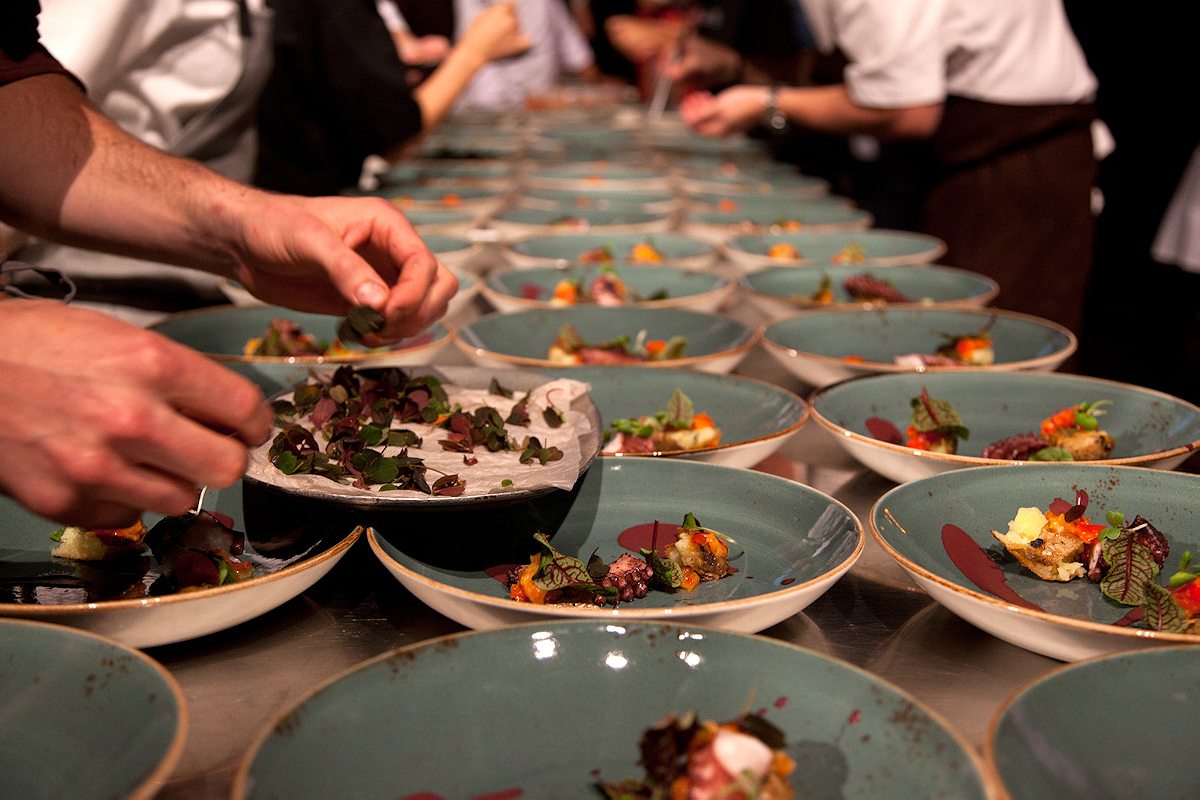
Acurio, leader of Peru’s culinary renaissance and tonight’s guest of honor, enters the room to applause. He lays out the plan for the evening, explaining the course of events, but also the significance of having everyone here together.
“Cooking is a vehicle. We are chefs, sociologists, musicians, and writers. We celebrate our differences with joy.”
He begins to detail the background of the dish and the ecological issues facing the octopus in Peru. In many cevicherias, baby octopus has become something of a delicacy.
“The younger, the more tender many believe, but there is no logic to it,” he says. “A baby octopus feeds 1-2 people, while an adult can feed 15-20.”
According the Angel Perea, a biologist with Instituto del Mar Del Perú, whom I spoke with the day before the event, there is a law “prohibiting removal of octopus less than one kilogram,” but many ignore it. It got so bad that Peru launched a seasonal ban in 2012, which was highly successful thanks to social media. While there are no official estimates of the octopus population according to Perea, it appears to be healthy now.
Acurio then issues a call to action.
“Everyone needs to do their part. If a restaurant is serving an octopus less than one kilo, we need to call them out on Facebook and Twitter.” His point is well-taken, though there’s at least some irony to the fact that we are all about to gorge ourselves on mountains of (adult) octopi.
Magnus Nilsson reads a poem he wrote about octopus’ slimy texture.
The party begins. Drummers in wide-brimmed hats and colored t-shirts pound on cylinders as the original version of the dish appears. The organizer Petrini, dressed in camouflage pants and a multi-patterned shirt, with a cigarette in hand, takes the mic. He tries to explain Gelinaz! succinctly: “It’s a not a dinner, but a performance.”
Magnus Nilsson, star chef of Fäviken in Sweden, comes out. “Up until a few weeks ago I never touched a raw octopus,” he says. “I didn’t want to.” He reads a poem he wrote about the slimy texture.
Behind us, the adobe bricks glow. On the screens above there is live footage of the dishes being prepared.
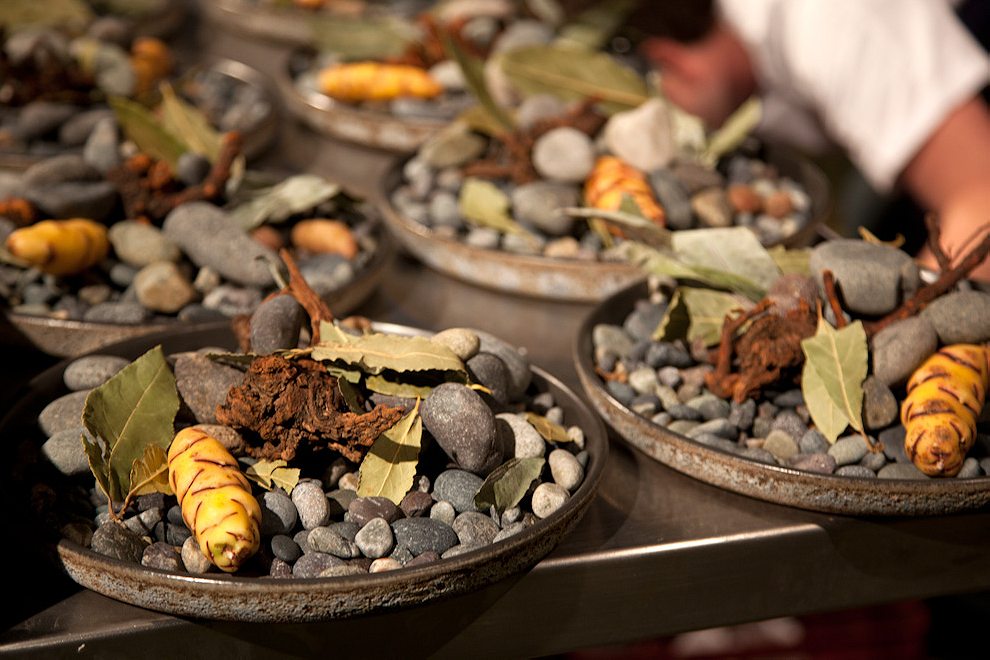
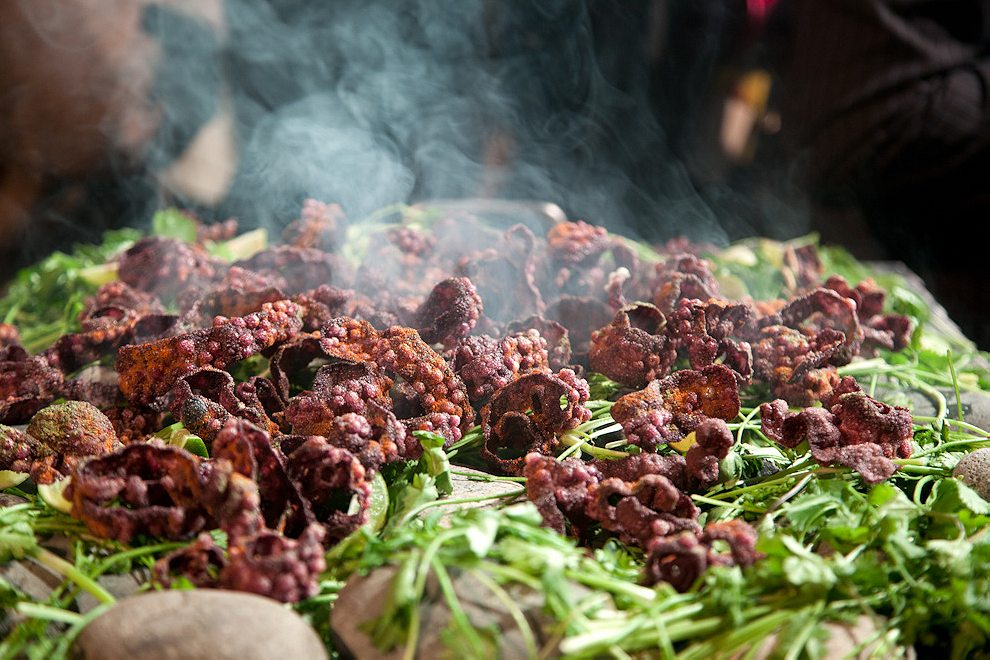
Petrini announces the chefs with their courses like a circus ringmaster. He calls Andoni Aduriz a poet. When he introduces Italy’s Davide Scabin he says “Now for something different, as Monty Python might say. I’d like to invite a good guy, a real motherfucker up to the stage. He comes from a fucked up country.” There is nothing but love though. It’s Scabin’s birthday. He presents him with an octopus-shaped birthday cake.
Scabin’s dish, named Ciber Pulpo Pisco Disco, is one of the evening’s most creative. The octopus is ground and formed into a pâté and stuffed into a small glass cylinder, which sits in a glass of pisco with octopus angostura. You need to blow the cylinder into the pisco then stir it, “like a cold soup,” he says.
An actual magician appears. He does a trick that involves audience members thinking of numbers while others are handed pictures of foods like arugula and calamari. Later he unrolls a scroll with the first letters of the food-cards spelling SCABIN and the numbers forming the correct date. Then he pours Fanta from a Coke can. It’s impressive. No one has a clue how he does any of it.
The night progresses, weaving from the experimental and odd to the utterly beautiful. It’s strangely like clockwork. Everyone works together seamlessly.
Albert Adria sets up charcoal grills layered with herbs and perfectly purple tentacles made from puffed rice crisps and dyed with concentrated octopus ink and sprinkled with anticuchera seasoning. Everyone picks pieces right off the smoking grill, squeezing quarters of lime on the tentacles.
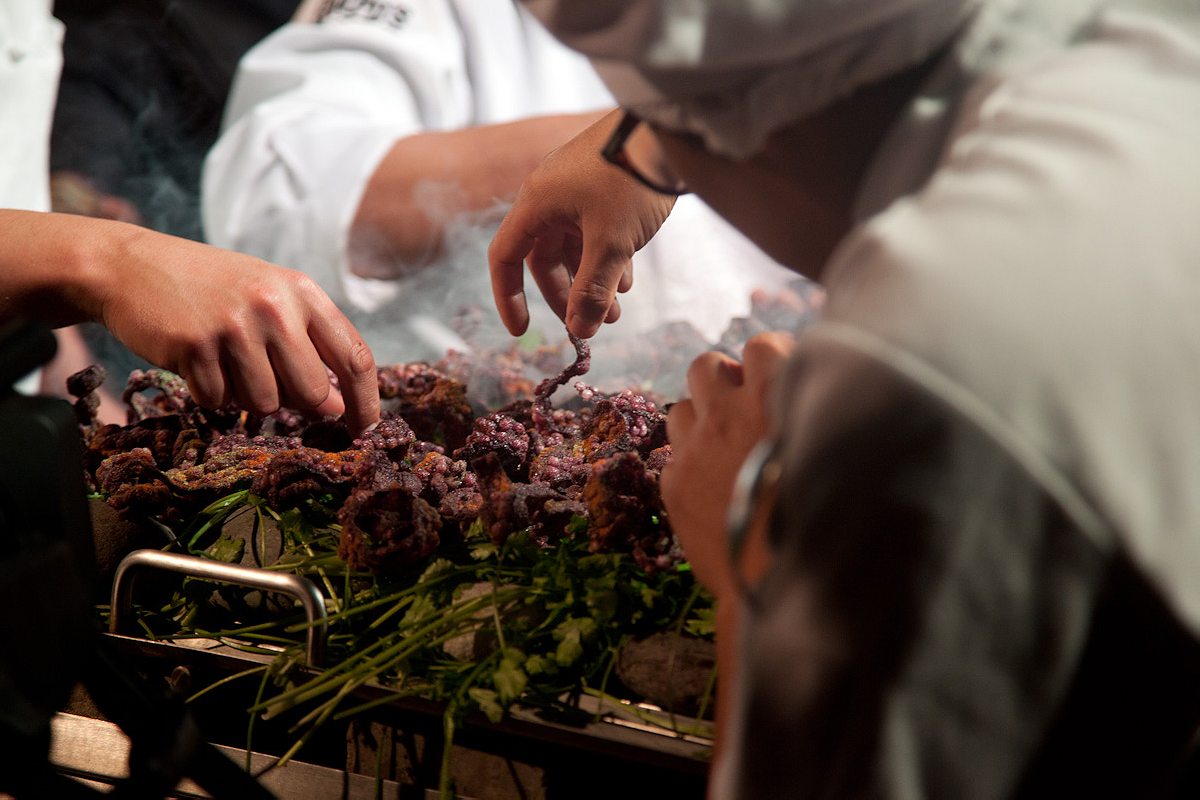
Mauro Colagreco serves what he calls ayahuasca consommé, while two women in silver dresses convulse and move in a hallucinogenic trance, complete with pronounced vomiting.
Daniel Patterson’s red, green, and yellow cold soup looks like a Miró. A video of monotonous everyday life—sickness, waiting, traffic, and death—appears on the screens. The soundtrack is Phillip Glass,from Koyaanisqatsi. “I don’t want to know the name of this song, because I never want to hear it again,” says the woman beside me. She means, I think, that she’ll never again experience this music in this way. It’s sadness, love, taste, smell, and sight—every sense and emotion woven together.
Other dishes are less successful. As Spanish food writer Ignacio Medina puts it bluntly on Twitter: “I beat an absolute record: I never spit out so much food prepared by top chefs.”
Daniel Humm is naked on a beach with an octopus on his genitals.
René Redzepi’s dish falls flat. He takes all of the ingredients and burns them like a mole, then makes a broth with it and places small native potatoes in. He wasn’t familiar with these particular potatoes, and they taste a bit raw. He apologized as he presented the dish. That morning at Mistura, he called for fundraising for Somalian chef Ahmed Jama’s Mogadishu restaurant the Village, which had been bombed for a third time by al-Shabaab, a group linked to al-Qaida. Redzepi’s mention explodes on social media. After his course I ask him how much was raised since the morning. “I can tell you.” He reloads a link on his iPhone. “$36,500.” The same afternoon Redzepi also sat solitarily in a corner of the kitchen at Virgilio Martinez’s Central peeling potatoes.
On the screens above, there’s a photo exhibition of each chef in an octopus-related pose. Daniel Humm is naked on a beach with an octopus on his genitals.
One by one they all come out to serve their dishes. Things turn progressively more disorderly.
Alex Atala, wearing a Death Happens t-shirt, serves gum with a layer of octopus skin over it. It’s soy saucey and minty.
The Predator appears. He bumps me in the back as I bite into Rodolfo Guzman’s Mulpo, a sort of mutant octopus tentacle that tasted better than it looked.

As Virgilio Martinez’s octopus with a garbanzo puree is served, a modern dance group called the Dada Riots appear. They are wearing ragged clothes and begin chanting and howling this improvised ancient tribal language. It’s fucking weird. When they finish, I ask Acurio, who Is standing beside me, “what just happened?” “I don’t know,” he says. “I’m still trying to figure that out.”
“It’s octopus and potatoes,” says Swedish chef Peter Nilsson when he comes out. “But I guess you know that by now.”
Petrini ties the Twilight books to Washington State’s Lummi Island when he announces Lummi chef Blaine Wetzel, who surprises everyone when he blasts vulgar gangsta rap when his Huamantanga potatoes and dried octopus is served.
Daniel Humm serves an octopus hot dog. Petrini asks, “Does everyone like intercourse?”
A Japanese Peruvian girl, one of the Dada Riots, gets drunk and steals the mic from Petrini. He lets her take it. He wants to see what she’ll say. “Peru might be a third world country, but it’s first world in culture,” she says. She’s a bit of a train wreck, but everyone loves it. Later she is writhing in the middle of the floor like a snake.
Instead of the naked women that appeared in Ghent, beefy male models dressed only in black underwear come out carrying a pot filled with uncooked octopi. They each pull out a two-kilogram slimy specimen and parade them around.
The magician gets drunk. He needs to be carried out.
Someone is fucking in the bathroom.
Still, inspiration finds it way.
Massimo Bottura chooses to do an octopus dessert because “I didn’t think it could be done,” he says. So, he makes fettuccini noodles out of seven different kinds of potatoes and an octopus broth. Calling it a dessert is a stretch, but it’s wonderful.
“I hope you enjoy it at 2:30 or whatever time it is,” he says.
Lastly, Peruvians Karime López and Pía León serve their dish, fittingly called Deceiving Creature. “Because the octopus mimics, and everyone knows the octopus in savory dishes, so we mimicked it in a dessert,” says López. They present a sweet potato cream with different textures of dried herbs sitting on a crunchy piece of octopus skin. A female Peruvian rap group soulfully sings in the background. It might be my favorite course of the night.
It’s three something now. The chefs, the ones who haven’t left, come together on stage with Petrini. They are drinking and smoking cigars.
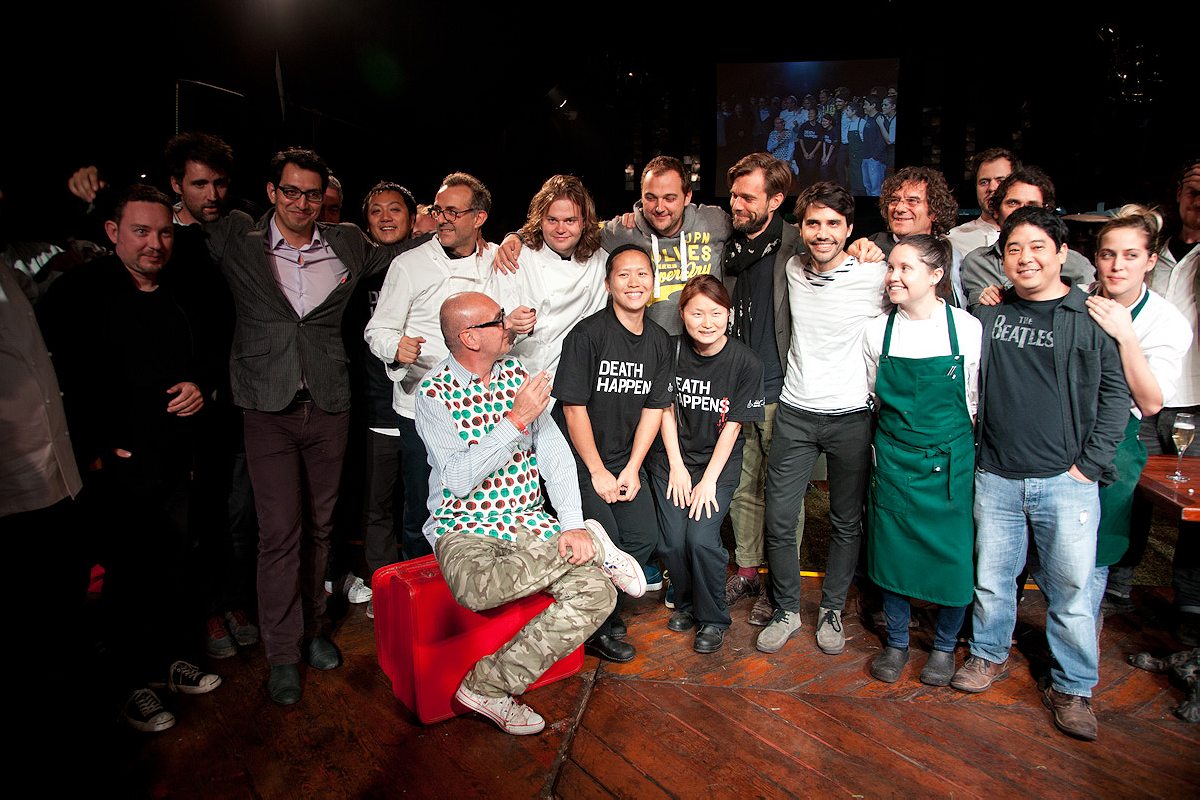
What just happened here? Some took Gelinaz! to be a joke. Dozens of seats were empty by midnight. Was it just a big, hedonistic, octopus feast? What has food come to? Is this evolving dialogue between chefs, farmers, thinkers, and scientists still going in the right direction? Are we still trying to end hunger without killing the planet? Has food jumped the shark? Is it meaningless? Just disorder and fucking in bathrooms and chanting? I don’t think anyone knows exactly, including Petrini.
Maybe something important didn’t happen tonight.
But maybe that’s the point. In the midst of all of this disorder, molecules are bouncing around, crashing into each other. Sparks are being ignited. Most will fizzle out. Some might not. Maybe something important didn’t happen tonight. Maybe it won’t in New York next year or wherever else this odd culinary collective goes, but maybe it could.
The octopus might be the physical embodiment of Gelinaz!: long limbs reaching out in different directions. Each is grasping something else, working independently from one another, but at the same time functioning together with the same brain.
Sometime after four the last chilcanos are served and everyone leaves. The huaca is still glowing from the artificial lights. It’s still dark out, but, even through the haze of Lima’s thick garua fog, the sun will come out. Eventually.